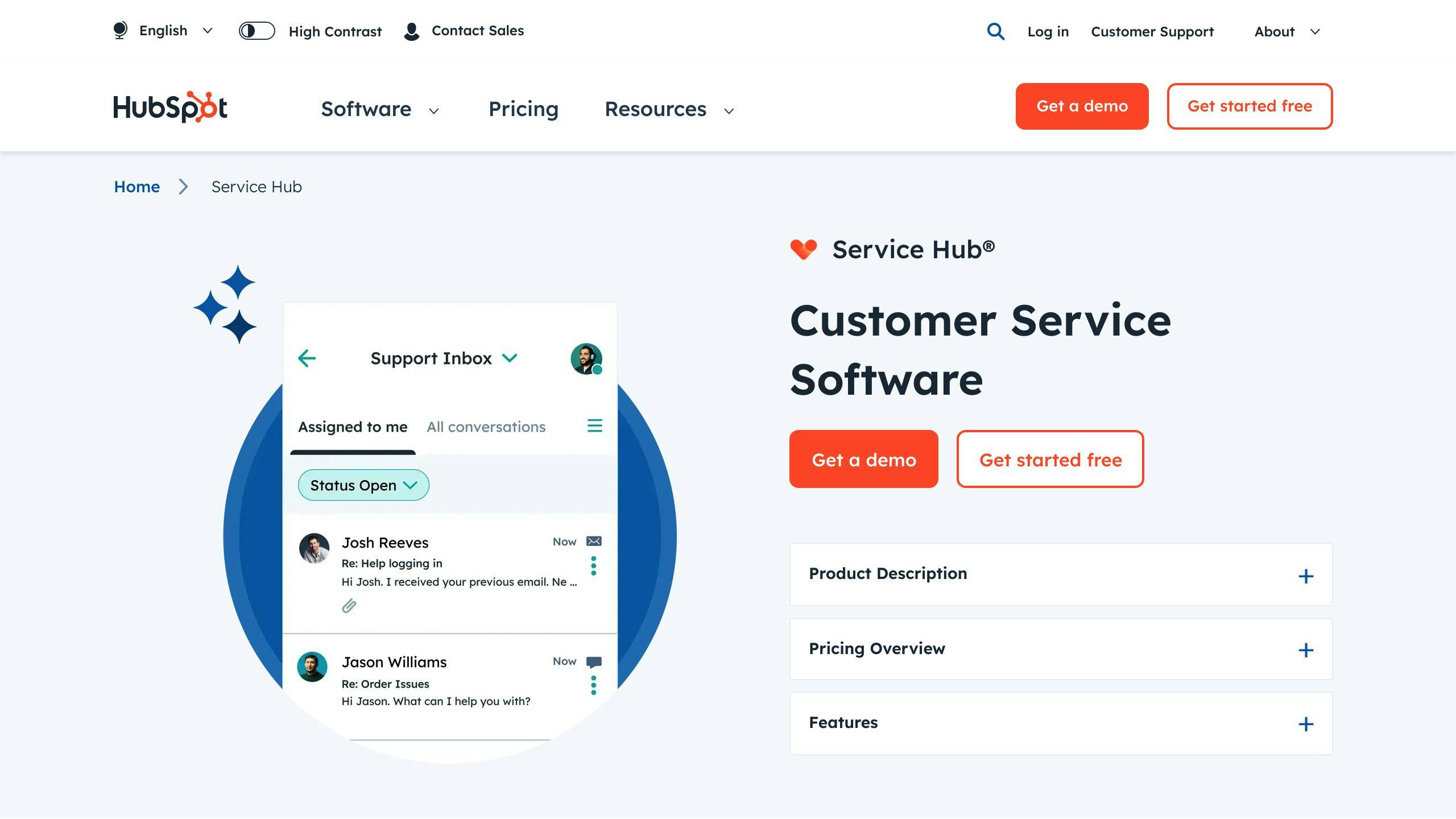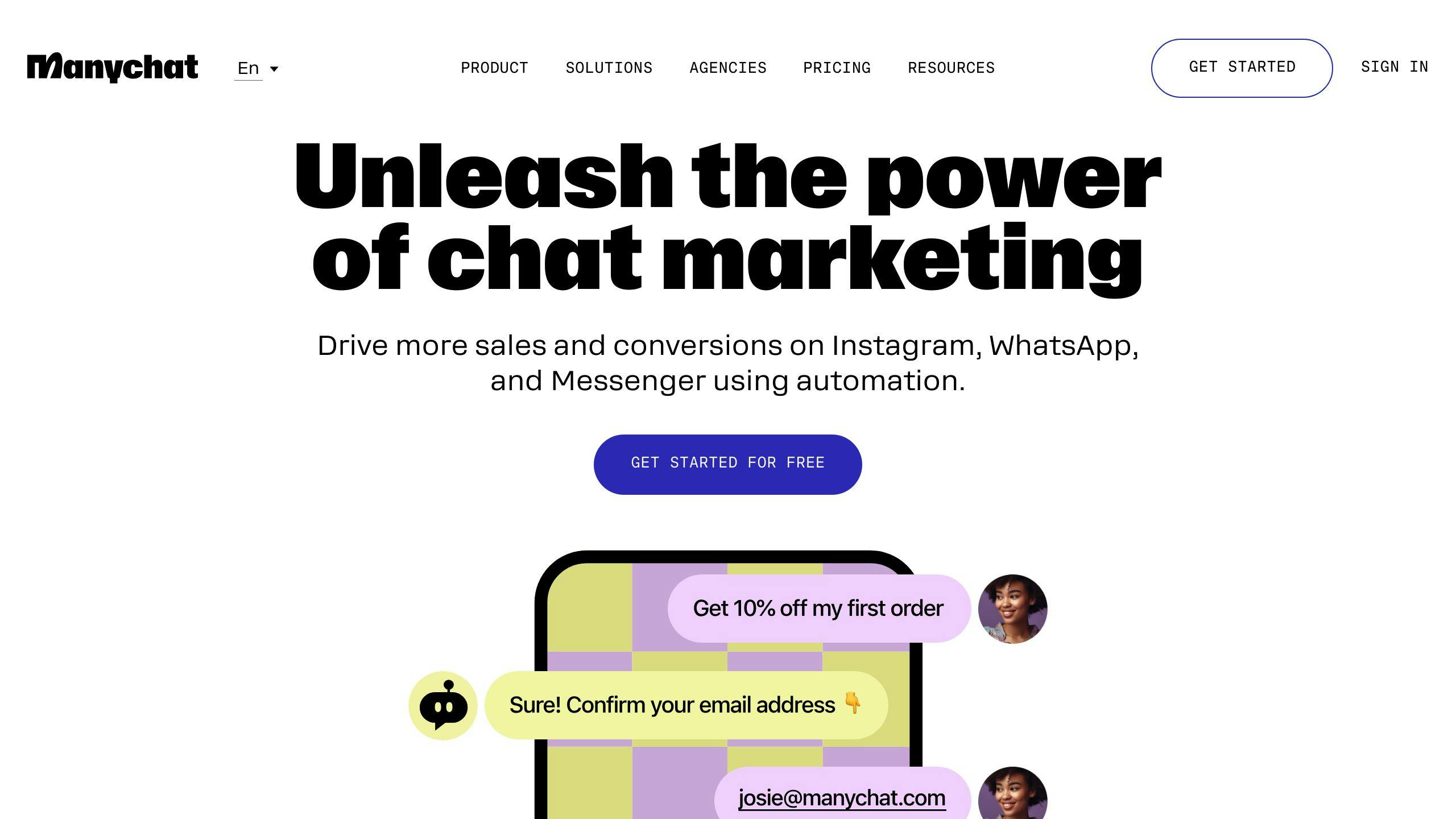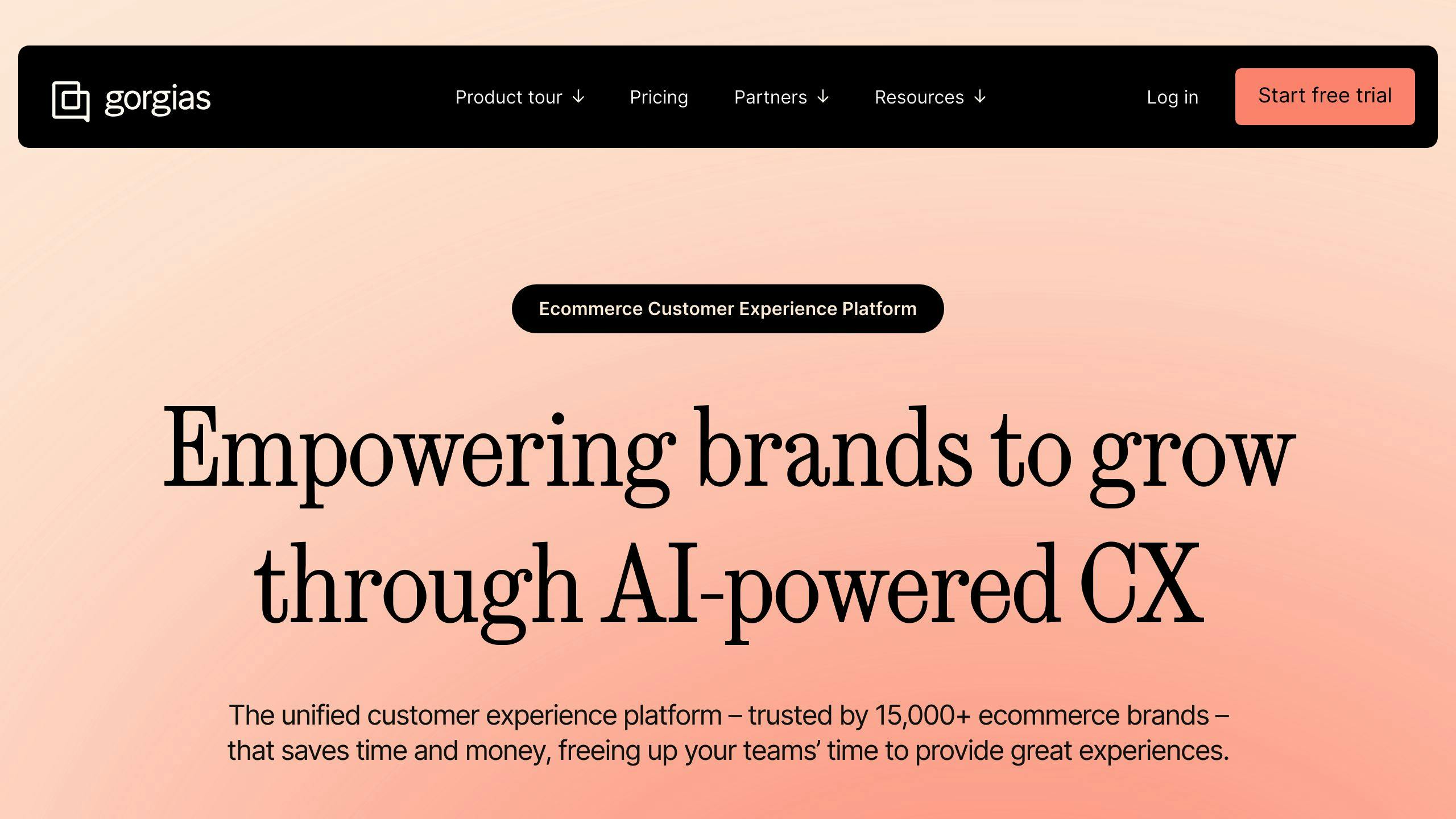AI tools are transforming how businesses handle customer support by automating repetitive tasks, predicting customer needs, and improving response times. Here’s a quick overview of five tools that can help small and medium-sized businesses provide better support:
- HubSpot Service Hub: Combines ticketing, 24/7 chatbots, and AI-powered analytics for efficient support.
- ManyChat: Simplifies communication with no-code chatbots and multi-channel support for platforms like Facebook and Instagram.
- Ada: Automates detailed, personalized interactions and offers real-time translation for global audiences.
- Intercom: Features custom bots, FAQ automation, and onboarding tools to reduce support tickets and improve engagement.
- Gorgias: Focused on e-commerce, it integrates with Shopify and automates order tracking and returns.
These tools help businesses shift from reactive to proactive support, saving time and enhancing customer satisfaction. Below, we compare their features and benefits to help you choose the right one for your needs.
Quick Comparison
| Tool | Best For | Key Features | Ideal Business Type |
|---|---|---|---|
| HubSpot Service Hub | Ticket management, analytics | 24/7 chatbots, sentiment analysis | Growing businesses |
| ManyChat | Social media support | No-code chatbots, e-commerce tools | Small businesses, e-commerce |
| Ada | Personalized automation | Real-time translation, proactive messaging | Large-scale operations |
| Intercom | Scalable interactions | Custom bots, onboarding assistance | Broad industries |
| Gorgias | E-commerce support | Shopify integration, Smart Rules | E-commerce businesses |
Read on to learn how these tools work and how they can fit into your customer support strategy.
6 Top-Rated AI-Enabled Tools for Customer Service
1. HubSpot Service Hub: Features for Better Support

HubSpot Service Hub is an AI-driven platform designed to blend automation with personalized customer support, making it easier for small and medium-sized businesses to manage and grow their operations.
One standout feature is its AI-powered analytics, which streamlines ticket routing and performs sentiment analysis to address inquiries quickly. It also uses predictive lead scoring to flag high-priority interactions based on historical data, helping teams address potential problems in advance.
The platform supports multiple communication channels and offers tools like 24/7 chatbots, sentiment analysis, and AI-suggested articles:
| Channel Type | Support Features |
|---|---|
| Web Chat | 24/7 AI chatbots, Live agent handoff |
| Automated responses, Sentiment analysis | |
| Knowledge Base | Self-service portal, AI-suggested articles |
| Social Media | Unified inbox, Automated routing |
For businesses worried about setup, HubSpot Service Hub includes built-in training materials and customizable templates, making the onboarding process smoother and faster for teams.
Another key feature is real-time insights. These AI-driven recommendations help agents during customer interactions, cutting response times and continuously improving through machine learning.
The platform is also designed to grow with your business. Whether you're handling a handful of inquiries or thousands each day, its automation tools adjust to meet your needs. The starter plan includes basics like ticketing systems and chatbots, making it a practical choice for smaller businesses. As your business expands, you can easily upgrade to access more advanced features.
HubSpot also integrates effortlessly with other tools, ensuring a smooth flow of data and a unified view of customer interactions.
While HubSpot is ideal for scaling customer support, other tools like ManyChat focus more on simplifying communication processes.
2. ManyChat: Simplifying Customer Communication

ManyChat is a conversational marketing platform designed to make customer interactions easier. With its AI-powered automation and no-code chatbot builder, it’s a great option for small and medium-sized businesses that don’t have in-house technical expertise.
One of ManyChat’s standout features is its ability to manage communication across multiple channels. It integrates smoothly with platforms like Facebook Messenger and Instagram, providing consistent support while centralizing all interactions in a single dashboard.
ManyChat’s automation tools are particularly helpful for improving customer support:
| Feature | What It Does |
|---|---|
| Audience Segmentation | Sends personalized responses based on customer behavior, like offering tailored discounts based on past purchases |
| Conversational Flows | Creates custom interaction paths to suit different customer needs |
| 24/7 Support | Handles common questions automatically, even outside business hours |
| E-commerce Integration | Automates tasks like order tracking and sharing product details |
By automating routine inquiries, ManyChat allows support teams to focus on more complex issues. Its personalization tools analyze customer behavior and purchase history to deliver timely, relevant responses, improving both satisfaction and engagement.
For e-commerce businesses, ManyChat is especially useful. It can automate updates on orders, returns, and product questions, reducing workloads while maintaining high service levels. Plus, its AI features give support teams quick access to customer data, making interactions more efficient.
While ManyChat excels at simplifying communication and automating everyday tasks, Ada takes things further with its advanced AI-driven interaction capabilities.
sbb-itb-bec6a7e
3. Ada: Automating Customer Interactions
Ada is a conversational AI platform designed to change how businesses manage customer support. It goes beyond simple chatbots, offering tools to handle customer interactions efficiently and at scale.
What sets Ada apart is its ability to manage detailed, personalized conversations while seamlessly working with existing systems like CRMs and support tools. Its AI analytics engine learns from every interaction, helping predict customer needs and deliver tailored support.
| Feature | Capability | Business Impact |
|---|---|---|
| Ada Glass | Smooth transitions between AI and agents | Minimizes frustration during escalations |
| Ada Engage | Personalized, proactive messaging | Boosts engagement and prevents support issues |
| Ada Translate | Real-time translation in 100+ languages | Expands support for global audiences |
For instance, with Ada Engage, the platform might notice a customer repeatedly visiting the same support article without finding a solution. It could then send a proactive message offering help or even schedule a call with an expert.
Ada's ability to scale shines during busy periods, keeping response quality consistent even with heavy conversation loads. By analyzing past interactions, it identifies potential issues early, allowing businesses to address them before they grow.
To make the most of Ada, businesses should focus on clear use cases, design easy-to-follow workflows, and continuously improve based on customer feedback.
Ada helps businesses deliver excellent support while easing the workload on human agents. While it specializes in automating complex interactions, platforms like Intercom offer a wider range of tools for creating more personalized customer experiences.
4. Intercom: Tools for Smarter Support

Intercom offers AI-driven tools designed to improve customer interactions by combining automation with a personalized touch.
Its platform revolves around three key tools that simplify and enhance support:
| Tool | Purpose | Benefits |
|---|---|---|
| Custom Bots | Qualifies leads and gathers feedback | Cuts manual screening time by 85% |
| Resolution Bot | Handles FAQs and resolves issues | Manages up to 33% of queries without human help |
| Product Tours | Guides onboarding and educates users | Reduces support tickets by 40% with proactive tips |
The Resolution Bot improves with each interaction, learning to better address customer questions. This has led to impressive outcomes, like a 90% drop in customer wait times and a 25% boost in satisfaction rates. For instance, Product Tours can guide users through account setup, helping them get started without needing extra support.
Intercom stands out for its ability to grow with businesses and its seamless integration with tools like Salesforce, Zendesk, and Slack. These integrations allow support teams to keep track of customer interactions across multiple channels, ensuring consistent and informed communication.
By leveraging customer data, Intercom delivers tailored support experiences. To get the most out of the platform, businesses should focus on integrating data, creating natural conversation flows, and tracking performance metrics to fine-tune their support strategies.
Intercom works well for businesses looking for scalable and personalized support solutions. While it caters to a broad range of industries, Gorgias remains a better fit for e-commerce companies with specialized needs.
5. Gorgias: Support for E-Commerce Businesses

Gorgias is an AI-driven help desk platform designed specifically for e-commerce businesses. It processes over 10 million customer support tickets each month, making it a strong choice for managing large volumes of inquiries. One of its key features is Smart Rules, which automates repetitive tasks to save time and improve efficiency.
Here's a quick breakdown of its most notable features:
| Feature | Function | Benefit |
|---|---|---|
| Quick Replies | AI-suggested responses based on past conversations | Speeds up replies and ensures consistency |
| Smart Rules Engine | Focuses on e-commerce tasks like tracking orders and handling returns | Simplifies workflow management |
| E-commerce Integrations | Links directly with platforms like Shopify and WooCommerce | Consolidates customer data for better service |
Gorgias connects seamlessly with platforms like Shopify, Magento, WooCommerce, and BigCommerce. By pulling in order history and shipping details, it enables support teams to provide accurate and relevant answers to customer questions.
However, the platform isn't without its challenges. The chatbot's natural language processing could be improved, and mastering the system requires some time and effort compared to other tools.
Tips for Getting Started with Gorgias:
- Start small by setting up quick replies, then expand to more advanced workflows.
- Train your team to fully understand the platform's capabilities.
- Regularly track response times and customer satisfaction to fine-tune your support process.
Gorgias uses a ticket-based pricing model, so businesses should evaluate their support needs carefully to manage costs effectively.
This platform shows how AI can be tailored for e-commerce, helping businesses manage customer interactions more efficiently while scaling their operations.
Conclusion
AI tools are reshaping customer support, allowing SMEs to deliver faster and more effective service. Tools like HubSpot Service Hub improve ticket management and customer insights, ManyChat automates messaging, Ada builds smart chatbots, Intercom supports personalized interactions, and Gorgias fine-tunes e-commerce support. This blend of automation and data-driven insights is changing how businesses handle customer service.
These platforms excel in three main areas: automating repetitive tasks, analyzing customer data for actionable insights, and handling large volumes of interactions efficiently. Together, these features help businesses provide better support while saving time and resources.
For SMEs planning to adopt AI-powered tools, the key is selecting solutions that fit their specific needs and integrate well with existing systems. As teams gain experience with these tools, they can unlock additional features to further improve their support processes.
While each platform offers its own strengths, they all share a common goal: shifting customer support from being reactive to proactive. By addressing customer needs early, businesses can create smoother and more meaningful support experiences.
The future of customer support lies in combining AI automation with human expertise. For companies ready to explore AI beyond customer service, platforms like AI for Businesses offer resources to identify and implement additional AI solutions. By striking this balance, businesses can deliver efficient, yet personal, customer experiences.


